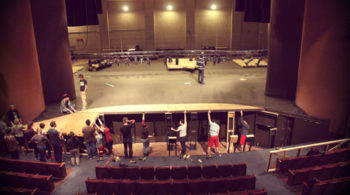I have never felt more independent in my life than during the train ride home coming out of my first semester at the College of William and Mary. After paying for the ticket myself, I confidently strode out of my last final, picked up my bags and hopped on my train, feeling well prepared for not only the eight-hour solo voyage lying before me, but whatever other challenges I would face in my now fully adult life. I opened a sandwich I had snagged from Marketplace before my final and proudly ate it, a reward for being such a well-functioning adult.
About two weeks later, I was back at the College, eating a hastily assembled mimic of my train meal made with pre-sealed Oscar Meyer turkey, a Kraft single and what was once one long piece of sourdough economically folded in half. It was at this very moment that I realized the irony in rewarding my adulthood with the very thing that was holding me back from it: the dining hall food at the College.
The reason for my early return to campus was Sinfonicron, devoting the final two weeks of my break to rehearse a show to be performed during the first week of classes. Although I was back at the College, the College itself had not yet returned, with my freshman dorm locked and the usually ample watering holes of Sadler, Commons and Marketplace barren. I lived off campus and discovered that my image of how a successful adult eats and lives could not be more distant from what my first semester had taught me.
It was at this very moment that I realized the irony in rewarding my adulthood with the very thing that was holding me back from it: the dining hall food at the College.
Going to a supermarket to buy food for myself was uncompromisingly foreign. For the first time in my life, I actually had to make the choice of choosing between name-brand and store-brand foods. What once was an easy decision with my parents on the tab turned into just as easy a choice the other way, as I ignored my Italian instincts to buy high-quality pasta and instead reached for the Great Value-brand rotini. I also found myself trying to get only just the right amount of food that would be needed to feed me throughout my time living off campus. As it turned out, the instinct to eat and take as much as possible that I had developed through eating at dining halls was a nearly polar-opposite train of thought than the one needed to most efficiently use food in real adulthood. Eating more food was actually the equivalent of losing money rather than gaining it.
The shock of the real world only increased when it came to actually preparing meals for myself. At Sadler, I would, without fault, be disappointed if I went at an inopportune hour and ended up with my only options being the pasta or a salad, scorning the simplicity presented before me. After spending an hour of my life haphazardly throwing together a mismatched Ragu sauce to adorn miraculously well-cooked pasta and throwing pre-made salad into a bowl, pasta and salad wasn’t a disappointment: It was a feast of biblical proportions, sacred and satisfying beyond belief. There was something about cooking for myself and others that had turned food from something merely existing to end my hunger to a shared experience of appreciation for not only what I owned, but for what I could achieve within my own means.
This week, after fully moving back into my dorm, I went to Marketplace and obtained the very sandwich that I had replicated. Although it was quite tasty, I found myself longing for my imitation, missing the freedom I was once granted and knowing that I was still that one extra step away from independence. I knew my own sandwich had been a poor re-creation of what Marketplace had assembled for me on a purely culinary level. Beyond this, however, was the intrinsic satisfaction of knowing that, while the sandwich was a mess, it was my mess. My beautiful, homemade, adult mess.
Email Anthony Madalone at asmadalone@email.wm.edu.

